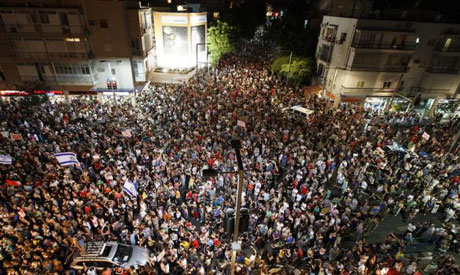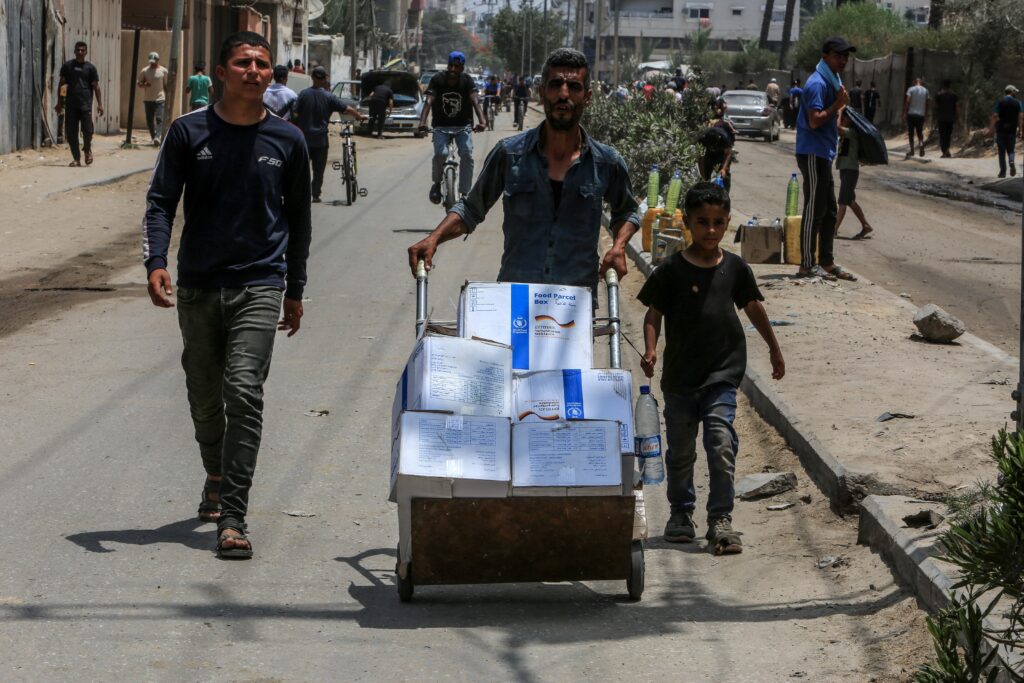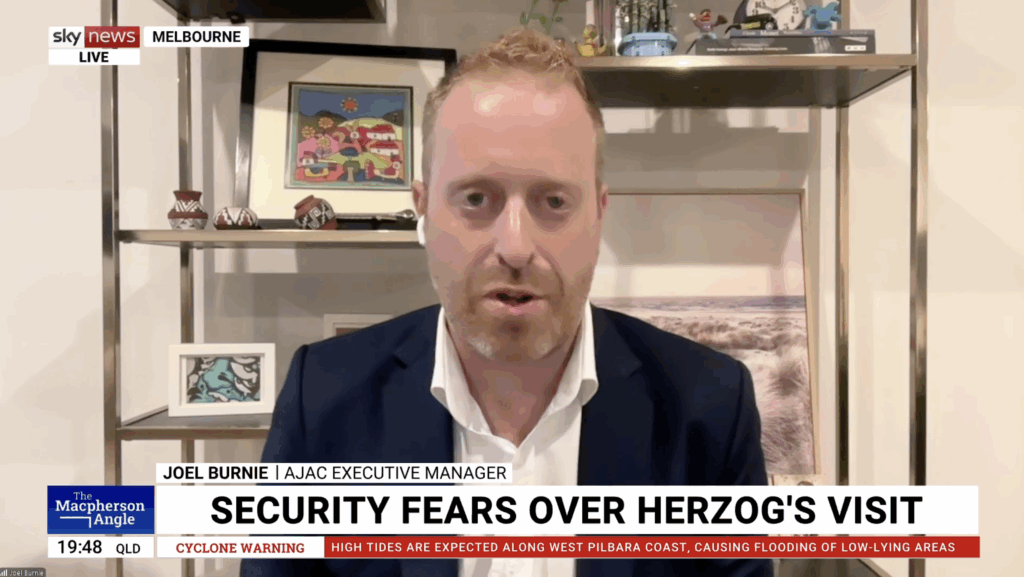UPDATES
Recommended reading on Israel’s social protest movement
August 22, 2011 | Tzvi Fleischer

While Israel’s Social Protest movement, which has dominated Israel headlines over the past few weeks, has been eclipsed for the moment by the major terrorist attack in southern Israel on Thursday and subsequent events, it is likely to remain a significant source of debate and political power in Israel for some time to come. I’ve therefore compiled a longish collection of recommended reading for those who want to better understand the movement and the debate it has sparked in Israel.
One protest leader, Gilad Perry, explains what he believes has led to the protest movements:
…something has changed in Israel. I am not speaking about the conflict. I am speaking of the rift that has broken down the solidarity within the country and compromised our ability to survive as a small state in the Middle East. I am speaking of the fact that out of all OECD (Organization for Economic Co-operation and Development) member countries, Israel has the most crowded hospitals, the most crowded classrooms and the highest level of poverty. Violence is on the rise, and the periphery is collapsing. This is not the state that Herzl envisioned. It is not Jewish, not Zionist, not democratic.
Another protest participant, journalist Shai Zamir expresses a similar view:
The protest is not confined to a handful of people who insist on living in Tel Aviv: It is the protest of anyone who feels that the middle class, who work hard to make a living and seek a reasonable standard of living, keep sinking lower. It’s the protest of all those who look around and see the immense wealth spread throughout central Israel, knowing that the pie is being divided unfairly.
A good editorial explaining the background to the protests come from Britain’s Financial Times, which notes, among other things:
It is tempting to draw a parallel with the Arab spring protests that began with a vegetable vendor in Tunisia and brought hundreds of thousands of Egyptians on to Cairo’s Tahrir Square. But such a comparison is misleading. True, a perception that too many people cannot make ends meet, or even live in outright poverty, motivates Israelis as it did Tunisians and Egyptians in January and February. But Israel is a democracy; the anciens régimes in Tunis and Cairo were autocracies. Political corruption is not unknown in Israel, but the government is not a kleptocracy. Israelis are not trying to overthrow their state.
Another good summary of the realities, grievances and atmosphere of the protest movement comes from noted Israeli journalist Nadav Eyal:
Commentators and politicians disagree about the reasons behind the protest. But they agree that it represents the most powerful social unrest Israel has seen in decades. Never before have so many Israelis taken to the streets over social issues; huge demonstrations have historically been confined to security and peace debates. Now that the peace process has stalled and overall security is relatively stable, the protests have dominated the news cycle and changed the national conversation.
… the demonstrations seem to have no end in sight. Yet even so, the protesters’ grievances remain vague and unfocused. Some call for an end to Israel’s decades-old privatization process and an expansion of the welfare state. Others demand an end to cartels and import taxes — cornerstones of free-market philosophy. The unifying factor among them is anger toward the status quo. And as the protests widen, they could spark a massive social and political shift in Israel.
These potential political implications of the protests are being explored by many commentators. As a backgrounder put out by the British-Israel Communications and Research Centre (BICOM) noted, the political debate in Israel appears to be shifting:
Although the protests’ direct political impact is still in question, the past few weeks have seen a dramatic shift of Israel’s political priorities. For the first time in three decades, the country’s conservative fiscal policy is being criticised and challenged. In addition, social and economic questions are no longer being overshadowed by security concerns or the pursuit of Israeli-Arab peace.
Since the economic crisis of the 1980s, consecutive Israeli governments on the left and the right have led a highly restrained fiscal policy, cutting public spending, keeping debts low and privatising government firms. This resulted in rapid economic growth and resilience at a time of global economic turmoil. Israel has often been referred to as an “economic miracle,” a “start-up nation” of hi-tech entrepreneurs and advanced industries. Yet recent decades have also seen the erosion of the country’s social safety net and widening social and economic gaps. Though both left- and right-wing governments adopted this policy, Benjamin Netanyahu became a leading advocate of fiscal-conservative policies and is therefore the target of much of the protesters’ criticism.
It was assumed that the relative calm in Israel’s security situation in the past two years meant that mainstream Israel was content. The common assumption among leading Israeli commentators was that a government that could ensure security and prosperity would not face a real political contest. Ironically, the absence of an immediate security threat and the sense that prosperity was enjoyed only by a small elite encouraged many Israelis to lift their head above the parapet and challenge the social and economic status-quo.
However, Israeli political scientist Prof. Gerald Steinberg notes that a direct impact on the longevity of the current Netanyahu government appears unlikely, asserting:
…some editorial writers thrilled at what they referred to as a “crisis atmosphere” and “panic,” gleefully predicting Bibi’s imminent downfall.
But there is no evidence of panic, and little likelihood of a revolution. While protest leaders can get large crowds to turn out for demonstrations and street festivals, they are having trouble turning the malaise into concrete and realistic policies. As is often the case, the protesters know what they are up against, but converting slogans like “the people want social justice” into viable public policy is far more difficult. Different constituencies have different and even opposing priorities, making this task more difficult…
In theory, social protests benefit the Left; in Israel the political reality is more complicated. This political vacuum is reinforced by the official opposition, led by Tzipi Livni and her Kadima party, which is weak and divided. For many decades, the Labor Left, in various forms, was the dominant power, and was responsible for socialist policies that choked economic development and empowered a privileged and often corrupt elite. During a brief return to power in the early 1990s, the Left led the messianic peace efforts, but the collapse of Oslo furthered damaged its image among many Israelis. Similarly, numerous civil society groups that claim to promote social justice, but have devoted much of their resources to promoting failed peace plans, are largely ineffective, and some have even hidden their involvement in the demonstrations to avoid the popular backlash.
As a result, with the Left splintered into numerous small factions, they have not provided the coherent and realistic alternative policy needed to turn the protests into a political comeback…
In the absence of credible alternatives, the Netanyahu government is not seriously threatened by these demonstrations and the summer of social protests.
But Israeli columnist Attila Somfalvi warns that Netanyahu and his political allies risk serious negative consequences at the next election unless a significant change of course is made:
The prime minister knows that the masses don’t want his head, yet, but wish to affect his thinking and see Netanyahu changing his socioeconomic spots. The public wants hope; the same hope that Netanyahu showed great expertise – during two terms in office – in burying. Should he fail to restore hope and change his ways, he and his friends – not only in the coalition but in the opposition as well – will be hit hard.
A number of commentators have noted how the peacefulness of the protests in Israel has contrasted with the looting in Britain, the violence of the Arab spring, and even past protest movements in the US.
Thus, in the Washington Post, someone calling themselves “techcrunch.com” comments of the Israeli protests:
…it’s been four weeks and zero acts of the barbaric, non-discriminatory violence we’ve seen across the middle east, and even in the UK. No shots fired. No stores looted. No form of communication has been shut down. In fact, not only have the Israeli police and army not taken any role other than safeguarding the protests themselves, they have even been applauded, literally, by hundreds of thousands for their efforts.
While in neighboring countries regimes are slaughtering the opposition, in Israel we have complete free speech to criticize our politicians and leaders…
At this point there’s no guessing which people will next rise-up and demand political and social change. The world is not what it used to be before Tahrir. I wonder though how many of these future civil disobedience movements will be modeled upon Israel, where technology and love trumped violence.
American writer and former sixties activist Sol Stern commented that his encounters with the Israeli protestors:
….reminded me of a phrase from the 1960s, “Democracy is in the streets,”… I attended many of those sixties demonstrations, and I recall that almost every one of them ended with one form of violence or another. I also remember the hatred that many self-righteous New Left demonstrators felt for ordinary Americans. By contrast, here on the streets of Tel Aviv, with almost no police visible, there was not a single reported violent incident. The middle-class demonstrators really did conduct themselves like participants at an open-air Athenian forum.
Veteran Australian Jewish leader Isi Leibler, now living in Israel, sees the movement as representing genuine grievances that must be addressed, but at the same time, argues that the government must avoid being panicked into fiscally irresponsible behaviour. He writes:
The government must now demonstrate compassion and a willingness to listen to the genuine grievances of the people. But at the same time, it must retain its nerve and avoid being panicked by populists employing “social justice” catch-phrases to justify spending sprees that could undo 20 years of responsible financial management overnight.
A Russian immigrant to Israel, Alexander Goldenstein, argues that he and many of his fellow Russians have avoided the demonstrations because of a belief they are a sign that Israelis have become spoiled:
My friends and I have not attended the social demonstrations, although life is hard for us too. My car cost twice as much as it would in Germany or Spain. French and British cheeses at the supermarket cost three to five times more. Housing is super expensive, and so is fuel. Beer at the bar – about four times more expensive than in Prague. Clearly, we need to make changes. Yet we do not go to demonstrations.
Why? Because we think that Israelis have become too spoiled. All over the world economies are collapsing; Greece, Spain, Ireland and others fall apart. And here those same artists want us to follow in the path of those failing economies. They want to live in the center of Tel Aviv, they want to shop in the store under their apartment and not in the cheaper supermarket far away, they want to sit in their coffee shops and bars – and that everything will be good. They have long forgotten the meaning of modesty, and what’s worse, they have long forgotten the meaning of responsibility. They want the state to care for them; they do not take responsibility for their fate.
Meanwhile, Israeli foreign policy analyst Dr. Jonathan Spyer noted that while participants in the protests do indeed represent a cross-section of the Israeli middle class and their genuine grievances, much of the leadership seemed to come from the extreme anti-Zionist left of Israeli politics:
That demonstration leaders and organizers indeed have a political agenda is easy to spot. Many have clear affiliations indicating their hostility both to the current government and to mainstream Israeli positions. Funding is coming from the New Israel Fund and its operational group, Shatil.
Yehudit Ilani, for example, a leader of the protests in Jaffa, is an Israeli-Jewish member of the hardline, Arab nationalist party Balad, which openly supports dismantling Jewish statehood and the “right of return” of Palestinian refugees, that is, Israel’s destruction…
Dafni Leef, another protest leader, is an employee of the New Israel Fund. Alon Lee Green, another of the most prominent organizers, is a member of Hadash, the Israeli Communist Party. And so on.
Finally, controversial columnist David Goldmann, aka “Spengler”, sees the protest movement as a very good sign for Israel – not because of anything they are specifically doing, but because the focus on “social justice” issues means that Israel’s security has been strengthened to the point where security and peace issues no longer need dominate the national debate:
Israel has never had a national political fight over economic history, for an obvious reason: Israelis were too worried about security issues to bother about the price of cheese. Never mind that Israel, one of the world’s most successful economies, has little in common with its neighbors, whose problem is that Chinese pigs will be fed before Arab peasants. The fact that the Israeli left has chosen to take a stand on economic issues shows that the national-security consensus around Prime Minister Binjamin Netanyahu is impregnable…
Whatever happens in Egypt-and it almost certainly will be ugly-Israel’s neighbor will be consumed by economic crisis for years and forced to cut military spending. Syria’s army is too busy killing Syrians to bother with Israelis… Israel’s strategic position has improved immeasurably in consequence of the Arab revolts…
Hope readers find this collection and the associated links helpful.
Tzvi Fleischer
Tags: Israel





